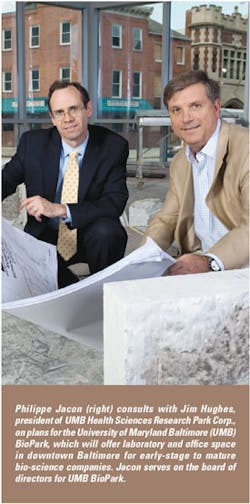Philippe Jacon
Professional
President, BD Diagnostics-Diagnostic Systems
Education
MS in Microbiological Engineering,
Universit'e de Bretagne Occidentale, France.
Personal
Enjoys traveling and golf.
Long history in healthcare.
Everything we do at BD is guided by the
intent to fulfill unmet or underappreciated healthcare needs throughout
the world. BD made blood collection safer and more efficient with
introduction of the BD Vacutainer evacuated blood-collection tube in
1949; and these tubes are used widely throughout the world today. In the
1960s, the company ushered in a new era in drug delivery by pioneering
the use of prefillable syringes as an easy, reliable way to deliver safe
and precise doses of medication. In 1973, we introduced our BD FACS cell
sorter, which revolutionized cellular analysis for clinical and research
applications. In 2005, we acquired GeneOhm, a small company with an
accurate, reliable method for detecting troublesome, drug-resistant
pathogens, such as MRSA. More recently, we expanded our capabilities in
women's health and entered into the field of early cancer detection with
the acquisition of TriPath, a cancer-diagnostics company. With
healthcare reform a top priority, we will undoubtedly see a greater
emphasis on prevention and early detection. Early, actionable
information can be critical for optimally treating a host of diseases,
especially cancers and infections. Patients and the healthcare system
will reap significant dividends from earlier directed treatment and,
presumably, the resulting reduction in more expensive acute and chronic
care.
Lab automation. The single most critical issue facing
clinical laboratories is the severe shortage of laboratory technicians.
With that in mind, we must find ways to decrease the workload on
technicians through automation. In that regard, we have introduced
products that streamline workflow, most recently through our BD Phoenix
AP, an automated instrument that cuts by two-thirds the sample
preparation time for antimicrobial-susceptibility testing. Similarly,
our BD MAX platform for rapid infectious-disease testing and our new BD
Viper System with XTR technology, a fully automated instrument for the
testing of STDs, will be a boon to increasingly personnel-challenged
laboratories.
BD's DNA. Our
corporate purpose of “helping all people live healthy lives” is
part of our corporate DNA and guides all our business and charitable
activities. Besides numerous local initiatives, all BD associates are
invited to apply for our Volunteer Service Trip Program — a three-week
assignment to improve access to healthcare in medically underserved
regions of the world. In 2008, BD associates worked with Direct Relief
International partners in Ghana. BD also collaborates with the U.S.
President's Emergency Plan for AIDS Relief, or PEPFAR, to send
volunteers to help expand high-quality laboratory services in African
countries affected by HIV/AIDS and TB.
Next generation. It is critical for professionals and
companies in the clinical lab business to expose students to this
rewarding career path. This means working with elementary and middle
school students to show them what a career in this profession means, and
what career-path options are associated with it. We support a variety of
programs that advance science education at all levels, and we encourage
students to view science as an exciting and remunerative career choice.
BD Diagnostics in Baltimore, for example, partners with schools,
colleges, and universities to show students what they can expect from
clinical diagnostics. We partner with a local high school for interns
who gain experience working alongside our scientists and engineers. We
have a relationship with Johns Hopkins University, where students in its
regulatory affairs program work at BD and have part of their tuition
reimbursed by the company. As part of my role on the Maryland Life
Sciences Advisory Board, I am leading the initiative on workforce
development and education, specifically, how to interest more young
people in life-science careers.


